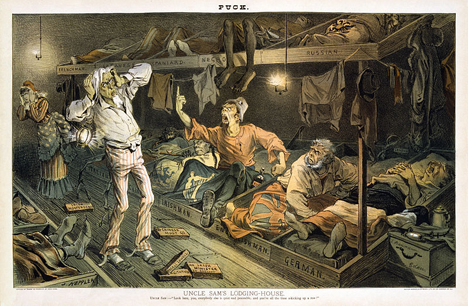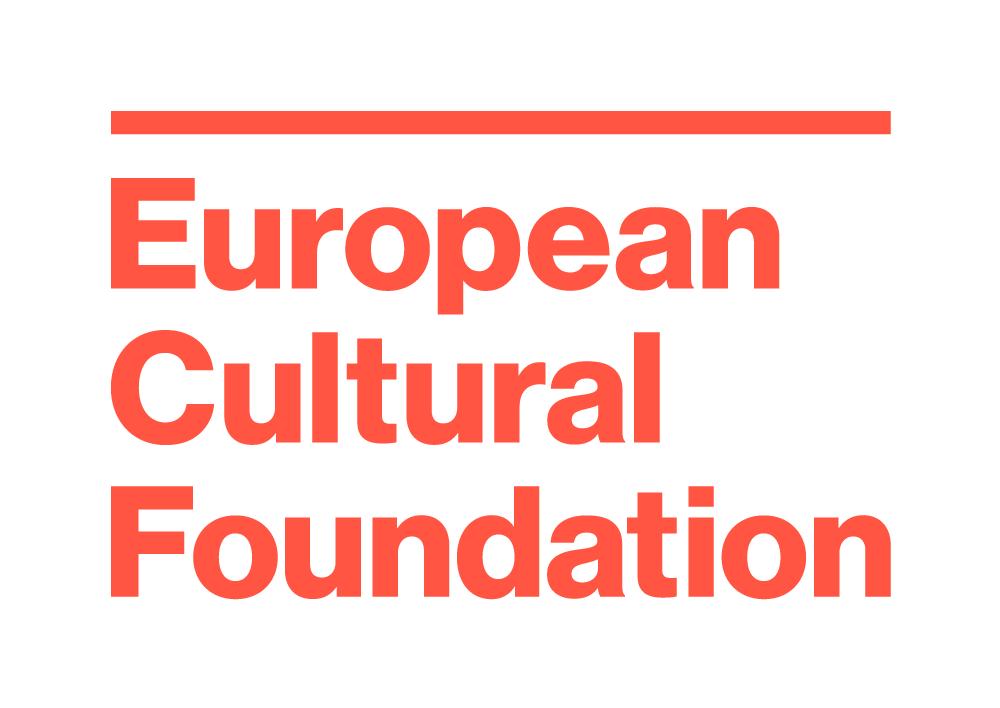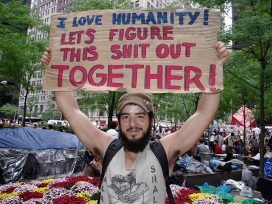The debate about migration in political and media discourse is dominated by issues of economics and culture, while only the ethical approach reveals the question of power, writes Phillip Cole. The left must on one hand understand anxieties people have about immigration, but on the other show courage in contesting beliefs based on untruths.
The debate about immigration in political and media discourse is dominated by issues of economics and culture. The key economic questions are: How much do immigrants pay in taxes compared with what they claim in benefits? What is their impact on wages and jobs? What is their impact on social resources such as health and housing? Are particular regions facing an unfair economic impact compared with others? The cultural questions are whether national identity will be diluted, whether multiculturalism is still tenable, and whether the social cohesion needed for democracy is being undermined. And we see much the same economic and cultural focus at the intellectual/academic level. What is often overlooked, however, is that there is an ethical dimension here. It may be that, even if specific economic and cultural concerns about immigration have weight, ethical concerns outweigh them. In this essay I explore what these ethical concerns are and what happens when we add them to the immigration debate. My argument is that an ethical approach reveals the question of political power, and who is, and ought to be, subjected to that power.

Uncle Sam: “Look here, you, everybody else is quiet and peaceable, and you’re all the time a-kicking up a row!”. Author: Joseph Ferdinand Keppler (1838-1894). Illustration in:, v. 11, no. 274 (1882 June 7), centerfold. Source: Wikimedia
Stuart Hall, Doreen Massey and Michael Rustin identify the importance of developing a progressive political project ‘which transcends the limitations of conventional thinking as to what it is “reasonable” to do’, and to have a debate that goes beyond ‘matters of electoral feasibility’.1 This is certainly not what tends to happen in the debate about immigration, which is almost always framed within the confines of the ‘reasonable’ and the ‘feasible’ rather than the radical. Indeed the left has found immigration to be a divisive and difficult subject. And it has also often been suspicious about bringing an ethical aspect into the debate, seeing that kind of move as a form of liberal ‘entryism’. But the left’s commitments to solidarity and internationalism have always been underpinned by a strong moral vision of equality and humanity, and in this essay I therefore explore what those commitments mean when it comes to immigration.
The role of unreason
Before I begin it might help to clarify what is at times a complex and confusing debate. We should not characterise the argument as being either for or against immigration. There are those who believe that immigration has certain negative economic and cultural impacts, which weigh against it, and those who think that it is largely beneficial to receiving societies. But those who stress the negative impacts rarely want to close borders altogether, and those who are more positive rarely want to open borders completely. Another clarification worth making is that those who do advocate freedom of international movement are not necessarily arguing for a ‘no borders’ view. They are not arguing for a world in which distinct communities with clear membership boundaries do not exist. They are, rather, pointing out that the majority of political communities succeed in having members, democratic structures, tax-raising powers, responsibilities and a sense of identity, without
the need for immigration controls. The fact is that virtually all nation-states have regions, districts and cities, and in many cases nations, that have some degree of autonomous power and strong identities, but have open boundaries. National borders of exclusion are the exception not the rule. So there are many reasons to resist reducing the argument to a close-borders/no-borders polarity.
If this is right there is plenty of room for reasoned discussion about immigration. However, another feature of this debate is the extent to which people refuse to see the reasonableness and evidence of the opposing side. There are certain beliefs about immigration which are very difficult to shift: whatever the evidence to the contrary, it is simply ‘true’ that immigrants are here to claim benefits and exploit the health system, and that they take ‘our’ housing and jobs and lower ‘our’ wages. And so UKIP can win the debate in the face of rational argument and evidence. This can be exhausting and demoralising for those who stress the more positive view of immigration. But this ‘unreason’ is not only encountered in political and media discourse; it also operates within the academy. I remember an academic I greatly admired insisting to me at a conference that my position was untenable because immigration inevitably lowered the wages of ‘local’ workers. When I pointed out that the available evidence did not back this up, he dismissed me with great confidence, despite the fact that I had researched the issue in some depth and he had not – it was not his area of academic expertise. At another conference, a world expert on global health who had investigated the claim that immigrants were exploiting the United Kingdom’s National Health Service for HIV treatment, and had found no evidence for it at all, was challenged by an admired colleague whose expertise lay elsewhere, insisting she was wrong and that health tourism was definitely taking place. I and the expert exchanged glances and changed the topic in the recognition that what often accompanies these assertions of certain ‘iron laws’ of immigration is a level of emotional force which signals that there is no room for argument here.
Immigration and immorality
There are thus profound obstacles to introducing an ethical dimension to this debate, but my object here is simply to introduce that ethical dimension – so that it is at least visible – and to see what impact it has on the argument. And I want to begin with one more essential point of clarification: although there may well
be economic and cultural concerns about the impacts of immigration, the ethical concerns are not so much about immigration but about immigration controls. In other words, even if some of the concerns about immigration are legitimate, immigration controls may be an illegitimate means of addressing them. This focus on immigration controls brings to the fore the question of power, because they involve an exercise of power, by certain agents over other agents. Who is exercising that power, over whom and for what purpose, and is that exercise ethical?
There are two key arguments that make the case that immigration controls are unethical. The first is based on the assertion that the exercise of coercive power by a democratic state is made legitimate by the opportunities of those subject to that power to participate in political decision-making – those subject to the law have
had the opportunity to shape that law.2 Any other exercise of power is illegitimate. Immigration controls are coercive laws enacted against people who have had no such opportunity, and therefore immigration controls are illegitimate. Of course, in a legitimate democracy we may end up being subjected to laws which we object to, but would-be immigrants are not on the losing side of a democratic process – they are excluded from that process altogether. That men wielded political power over women in the United Kingdom before 1918 was a profound injustice, as was the fact that the white population of South Africa exercised political power over the black population until 1994. And the injustice here was not the exclusion of those parties from the franchise, but the enactment of law and therefore coercive power over the excluded, with no opportunity for them to participate as equals in the formation of that law. And the scale of that injustice is profoundly accentuated when we realise that the purpose of those laws was to determine the political status of the excluded, to deprive them of political membership as such.
The second argument is based on the principle of moral equality, and questions the right of exclusion itself.3 According to this principle, all people are to be treated as moral equals – no person is more morally significant than any other. It does not follow from this that everybody must be treated exactly the same, because some differences may be morally relevant and so justify different treatment. But what is ruled out is that a person’s life chances should be determined by morally arbitrary features. This principle is still a driving force in the quest for justice through equal treatment: factors such as ‘race’, ethnicity, sex, gender, sexuality, should not be permitted to determine life chances, and laws should affect all equally, regardless of differences. This is because these are factors over which people have no control – they have not earned these attributes, do not ‘deserve’ them, and do not merit special treatment or reward, or its opposite, because of them.
Two other factors over which a person has no control are who their parents are and where they are born. And yet immigration controls and citizenship laws pick people out for radically different treatment based on exactly these factors – someone born in the wrong place or to the wrong parents has no right to enter the territory or become a citizen. But the principle of moral equality tells us that laws that treat people differently depending on who their parents are or where they were born are arbitrary from a moral point of view and therefore unjust. And so immigration controls – which do just that – are unjust. The fact that I was born within a particular territory, or the particular national citizenship of my parents, gives me no more moral right to be here than someone who was born elsewhere or has parents who are citizens of another country.
One reply to this may be an appeal to contribution. The fact that I was born here or to particular parents means I will make a contribution to public life and contribute to social welfare through work and taxes, and to institution-building, by being an active citizen. But there is no saying that a person born within the territory, or to the right parents, will do any of these things, and no reason to suppose that a prospective immigrant will not do them, and so there is no moral basis here for making a distinction on the grounds of future contribution – if permitted entry, the would-be immigrant is just as likely to make that contribution as the citizen.
If we want to backdate the contribution argument rather than making it forward- looking, we might say that what gives me the right to be here is the fact that I have made these contributions while the would-be immigrant has not. But this is to overlook the fact of globalisation – that people from all over the world are making significant contributions to the standard of living in the United Kingdom; it is not only residents that do so. The contribution argument thus actually makes a strong case for more open immigration, not less – people should be able to follow the wealth they create. What also follows from this argument is that nobody has
the right to be a full member of the political community until they have made the required contribution, and this says nothing about who has the right to make that contribution in the first place – we are all in the same boat. Of course, we may say that the right to make the contribution depends on possessing citizenship, but then we have ended up where we started. And the fact is that arguments which try to justify the right of exclusion do have a tendency to go round in circles. Either that, or they come to a sudden halt at some arbitrary point beyond which reasoned argument is not permitted to go.
Immigration controls and the left
I have outlined here two very powerful ethical arguments that make the case that immigration controls as an exercise of power are unjust. This means that, if we do want to control the impacts immigration may have, we need to find other ways to do it. The position for some on the left has been that immigration controls are justified if they are used to protect workers from coercive exploitation by employers, who would otherwise import cheap labour in order to force down wages and degrade working conditions; the ruling class want to use the immigration regime to coerce the working class, and we on the left want to use it to protect them. This is seen as the crucial moral difference. But the problem with this position is that even if we do seize control of the immigration regime and use it to protect workers from exploitation, we are not exercising our power over the employers who are doing the exploiting, but over other workers. We are using the coercive force of immigration controls to bene t one set of workers at the expense of another set. We are not directing our coercive power at those who are actually responsible for putting people out of work and forcing down wages, but instead at people who are relatively powerless in the process. And the fact is that the coercive power of immigration controls cannot be directed at employers, because, as we know all too well, if they can’t get cheap labour into their factories they will take their factories to the cheap labour.
We also have to face the fact that immigration controls and citizenship rules have a dark and dismal history that is embedded in colonial exploitation and racism, and that the United Kingdom’s record here is shameful. Liberal theories of global justice often discuss the world as if slavery and colonialism had never taken place, but the fact that they did makes a profound difference to the immigration debate.4 The counter-argument from a left position has to be either that, despite all these problems, the protection of ‘our’ workers from capitalist exploitation is sufficient to justify immigration controls; or that if we were in power we would rid them of any connection with colonial history and oppression and racism, and exercise them in a purely rational way to protect ‘our’ workers. While the latter position may seem reasonable, we would still have to face the fact that we would not be using immigration controls to coerce capitalists, but to coerce other workers by keeping them out of the territory, or depriving them of legal access to the workplace. What does this mean for our notions of solidarity and internationalism? While the liberal approach to global justice ‘forgets’ colonialism and slavery, here we are in danger of forgetting not only this history, but also the fact of globalisation.
If we take a global perspective we get a better view of the role of immigration controls. What we see is that we are not talking about a single state (either a real liberal-capitalist one or an imaginary socialist one) operating immigration controls in its own interests. Rather, we are talking about a powerful block of capitalist states – for brevity, the global north – controlling the movement of people for its own purposes. That means keeping the global poor con ned to the global south – where most of them are – while allowing the ‘talented’ and wealthy to make the south to north journey, and keeping a more-or-less free movement regime between themselves. The European Union is an illustration of this: there is freedom of movement for EU citizens and pathways for desirable migrants from outside the EU, but a Fortress Europe for the unwanted. If we take the global north more widely, then movement is more-or-less unobstructed for global north citizens, while those who want to enter from the south face often insurmountable obstacles in terms of visa requirements and fences. And so the use of immigration controls is an act of power in order to keep out the global poor, and if we on the left were to use immigration controls to protect ‘our’ workers, we would be using that power to do exactly the same thing.
Progressive nationalism
Where does this leave us? Let us accept, for now, the concerns about the impact of immigration on the working class in the United Kingdom. Despite these concerns there are clear moral arguments against using immigration controls as a means of protecting workers from these impacts. But can we appeal to some kind of special connection to our workers which justifies us in prioritising them over outsiders? Particular connections and loyalties often push against the universality of ethical principles, and it is not always obvious which should take priority. Some would say that national loyalties have to carry some weight here, and that to insist on the priority of some vague idea of universal ethics is to inhabit a realm of cosmopolitan moral fantasy. The standard example is that there are two children in a burning building and you can only rescue one of them. If I ask you why you rescued this child and left the other to die, and you answer ‘because she is my daughter’, this reply carries immense weight. Any ethical theory has to make room for this kind of reply. But on the other hand we need to see that you made a tragic choice, not an ethical one, and that we should all be haunted by the child you left behind.
What’s more, while family ties are important to many of us, others may reject them for good reason, and in many cases following family loyalty is clearly ethically wrong – if my daughter murdered someone and asked me to conceal her from the legal authorities, for example. Family and other loyalties can sometimes pull us in a particular direction but it is not necessarily the right direction, and universal moral principles help us to see that. Furthermore, the kind of loyalties we (often but not always) find between family members cannot be used as a model for national loyalties. If we return to the burning house and this time your answer to my question is ‘because she is English’, then not only does this fail to carry the same weight as the previous answer, it may actually strike us as morally repellent. And so we cannot reject the universal pull of moral principles by arguing that ethics begins ‘at home’ – very often what happens at home is shown to be deeply morally wrong in the light of universal moral principles.
Perhaps we can draw on current discussion about a ‘progressive nationalism’ to show why we are justified in using immigration controls to protect our workers from others. But – leaving aside the merits or otherwise of progressive nationalism – it
is difficult to see how it could be made relevant to the immigration debate, and in fact few have used it in that context. The main reason that this discussion doesn’t connect easily with the immigration debate is that it is focused on developing a notion of ‘Englishness’, and it is hard to see how we can appeal to ‘Englishness’ in relation to immigration controls in the context of a multi-nation state. The implication is that we ought to devolve immigration controls to the nations, but if we do that why shouldn’t Wales, for example, impose immigration controls on the English? It may be that some on the progressive left see ‘Englishness’ as a benign and inclusive cultural identity, but they have to remember that others do not see it that way at all. If the reply is that we can bring all the nations together into a single immigration regime this is surely no more than a reassertion of the status quo: it is hard to see what the idea of ‘Englishness’ is adding. 5
A second way we might make a special appeal in order to justify immigration controls is to bite the bullet and identify with a distinct ethnic group, drawing on another discussion on the left about the ‘white working class’, and how their concerns, particularly about immigration, have been overlooked by politicians and theorists on the left. But constructing a homogenous group and identifying it as the white working class with a fixed body of views is a tendentious basis for argument, given that the reality is so much more complex. This is one crucial problem for this position, but there is also the problem of connecting it up with the ethics of immigration controls. If we do use those controls to address the concerns of a distinct ethnic group about immigration, then we are unavoidably back with an immigration regime imbued with colonial and racist baggage. At the same time we will alienate other elements of the working class who do not identify themselves in this way or with those views, some of whom are going to be very sensitive about that baggage. None of this is to say that we should not be addressing the concerns people have about immigration, but it is to say that we should be arguing against immigration controls as an answer to those concerns, and making it clear who is wielding the power that is disenfranchising, alienating and excluding them.
Evidence and argument
However, the argument may not be simply that these workers have concerns about immigration which we can address in ways other than through an immigration regime. Rather, it may be that immigration itself is having genuinely harmful impacts upon them. And we might argue that, putting aside all the questions about identity, these harms are so significant that even if immigration controls are ethically wrong, we are justified in using them. There is nothing incoherent about this lesser-of-two- evils argument, but it does compel us to take a good look at the economic evidence – does immigration have the sort of impact on jobs, wages, housing and health that justifies the use of immigration controls, despite the fact that, if all things were equal, we would have no justification for them?
In fact the economic evidence gives us a mixed picture. Immigration to the United Kingdom brings benefits and burdens, and while overall the benefits outweigh the burdens, the problem is that they are not distributed evenly. For example, the evidence is that the impact on wages can be mixed, depending on time and place, and in some cases wages rise as a result of immigration (there is no ‘iron law’ here). Also, while short-run impacts on both wages and employment can be negative, long-run impacts are more positive. However, the evidence does show that certain low-paid workers, most likely recent migrants themselves, tend to lose out.6 So while in general immigration, all things being equal, tends to bring economic benefits, there is evidence that people in vulnerable and weak positions can lose out.
But to use immigration controls to address this problem seems odd, because they leave in place the structures of power and inequality that make those groups weak and vulnerable. It is not immigration that causes their social position, but their position that makes them vulnerable to competition from new immigrants.
If we were seriously concerned about their vulnerability then we would surely address it in the name of social justice, and immigration controls will not help us
do that. Immigrants may be participants in a global economic order that creates poverty and hardship for many throughout the world, and some of those who suffer poverty and hardship are in the United Kingdom. But we are all participants in that global economic order and some agents are more powerful and more responsible for the creation of that poverty and hardship than others. To pick out immigrants
as somehow the main culprits, such that we are justified in using coercive power against them, seems clearly unfair. This, then, is the key argument the left has to address – immigration controls would seek to protect certain sections of the poor and vulnerable by punishing other sections of the poor and vulnerable, leaving the rest of us untouched and evading the question of who is really responsible for global poverty and hardship, and who, although not responsible, is complicit in it.
The ethics of emigration
But still the evidence does show that immigration does have at least some harmful effects on certain sections of our community, and so we come back to the question of what to do about that. Introducing ethics into the discussion seems to have led to a political paralysis, which is perhaps why ethics rarely enters into politics. Interestingly, we see more or less the same outcome in a recent discussion between Gillian Brock and Michael Blake about the opposite challenge, that of emigration – the ‘brain drain’ of talent from the global south to the global north, especially
of health professionals.7 While Brock argues that states in the global south have
the right to suspend or ‘delay’ the right to leave of these health professionals for a ‘reasonable’ period, Blake argues against this on ethical grounds, even if there are no other effective means of addressing the problem. The situation we are faced with is not merely unjust but tragic – there is no morally acceptable way of addressing this specific injustice (p227). Are we faced with a similar tragedy when it comes to immigration controls?
While I agree with Blake that suspending the right to leave is unacceptable, I disagree with him that this means there is nothing at all that we can do. There is a range of possible strategies open to the international community short of suspending the right to leave of health workers.8 One important point is that there are powerful players who have much more responsibility for what is happening, and should be doing something about it – not only wealthy states and international agencies like the World Health Organisation and the International Organisation for Migration, but also multinational corporations, who are extracting wealth from these regions when they could be employing people at fair levels of pay and investing in infrastructure, especially in the health sector. It seems to me that health workers are so far down the chain of power and responsibility that they cannot be called upon to make the kind of sacrifices that Brock suggests.
We should not take away the right to emigrate from people who want to leave their home state in search of a better – and in many cases simply less dangerous – life even if there is evidence that their departure could have harmful impacts on those left behind. This is because there are other more powerful agencies responsible for causing and curing those problems. It is deeply unfair to place that burden on the shoulders of the weakest and most insignificant agents, who only have their labour power to sell.
Solidarity and internationalism
So what can we on the left do?
First, we must speak truth about power. The United Kingdom’s resident workers and would-be immigrants are caught up in a global order in which enormously powerful agencies exploit them for their own ends. These ‘economic’ migrants are using what little power they have – their capacity to sell their labour – to make better, safer, lives for themselves and those around them. To support the state in using its coercive powers against them through immigration controls seems an obvious injustice we should not contemplate for a moment. However complex the story about global economic power may be, we must find ways of telling that story so that people can see where the responsibility lies.
Second, we must also speak truth to fear. We must listen to the anxieties people have about immigration and its effects on their lives and seek to understand them, but must also have the courage to contest their beliefs about immigration where they are based on untruths. We must put forward the counter-narrative that what is needed here is solidarity against those who create the conditions in which fear and anxiety about the ‘other’ take root.
Bringing the ethical dimension into the immigration debate can help us to do these things, because it allows us to see that those ‘others’ are human beings with the same aspirations as us, and that we are all being exploited and dominated by the power of the real others. We should not allow the solidarity and internationalism across identities and borders that we strive for in other areas to be set aside when it comes to immigration.
A version of this article was presented as a paper at the University of Chichester on 13 April 2016. Many thanks to Stephen Roberts and the participants in that research seminar for their helpful and constructive questions.
Stuart Hall, Doreen Massey and Michael Rustin, 'After neoliberalism: framing the present', in After Neoliberalism? The Kilburn Manifesto, Lawrence and Wishart 2015, p22.
See Arash Abizadeh, 'Democratic Theory and Border Coercion: No Right to Unilaterally Control Your Own Borders', Political Theory 36 No 1 February 2008.
See Phillip Cole, Philosophies of Exclusion: Liberal Political Theory and Immigration, Edinburgh University Press 2000; and 'Open Borders: An Ethical Defense', in Christopher Heath Wellman and Phillip Cole, Debating the Ethics of Immigration: Is There a Right to Exclude? Oxford University Press 2013.
See Cole, 'Open Borders: An Ethical Defense'.
For example, in a report for the Institute for Public Policy Research on 'Is There an English Nationalism?', Richard English does not refer to immigration at all (IPPR April 2011). Jon Cruddas and Jonathan Rutherford mention it once in their 'Selling England by the Pound' article, in relation to Enoch Powell, but do not mention it again (Jon Cruddas and Jonathan Rutherford, 'Selling England by the Pound', Progress, February 2011: www.progressonline.org.uk/2011/01/21/selling-england-by-the-pound/.
See Martin Ruhs and Carlos Vargas-Silva, 'Briefing: The Labour Market Effects of Immigration', Migration Observatory, May 2015. Also see Neli Demireva, 'Briefing: Immigration, Diversity and Social Cohesion', Migration Observatory, July 2015.
Gillian Brock and Michael Blake, Debating Brain Drain: May Governments Restrict Emigration?, Oxford University Press 2015. See also Cole, 'Comment on Brock and Blake: debating brain drain', Journal of Medical Ethics, online first publication, March 2016.
See Judith Bueno de Mesquita and Matt Gordon, 'The international migration of health workers: a human rights analysis', Medact 2005: www.equinetafrica.org/sites/default/files/uploads/documents/BUEhres.pdf.
Published 12 August 2016
Original in English
First published by Soundings 63 (2016)
Contributed by Soundings © Phillip Cole / Eurozine
PDF/PRINTPublished in
In collaboration with
In focal points
- Disintegration or revival?
- Mobilizing law for solidarity
- Solidarity after Machiavelli: An interview with Ira Katznelson
- Liberalism, populism and the challenges of post-transformation in eastern Europe and beyond
- The limits of solidarity
- On the borders of solidarity
- The crisis of neoliberalism in Europe
- Utopian dreams beyond the border
- The politics of nature in the Anthropocene
- Strangers when we meet: Identity and solidarity
Newsletter
Subscribe to know what’s worth thinking about.
Related Articles

Vienna’s hosting of Ukrainian artists and writers recalls the days of the fin de siècle, when the city was a magnet for intellectuals seeking freedom from Tsarism. But despite strong historical affinities, subtle barriers to solidarity with the Ukrainian exiles remain.

Prisoners of conscience
A conversation with Myroslav Marynovych
Defenders of human rights often face high stakes. When the Ukrainian Helsinki Group openly challenged the Soviet Union in the name of the 1975 Universal Declaration of Human Rights, young dissidents soon became political prisoners. The price for being a non-conformist was steep yet encouraged solidarity, paving the way to Euromaidan.






